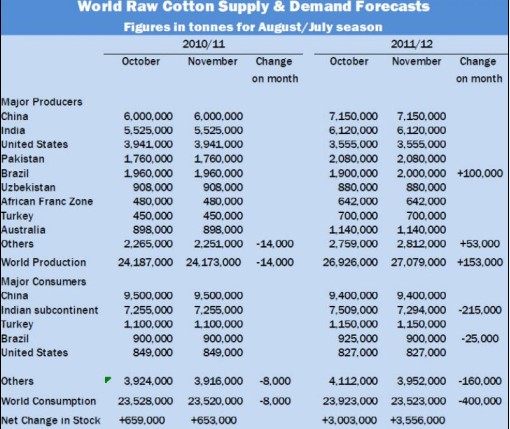|
KARACHI: The government's decision of imposing 15 percent regulatory duty on cotton yarn exports will affect the major fibre of the textile sector, Pakistan Yarn Merchant Association (PYMA) said on Friday.
Cabinet Committee on Textile at a meeting on Wednesday imposed 15 percent regulatory duty on export of yarn up to July 12, 2010 to ensure yarn availability to the downstream textile sector. Textile Minister Rana Farooq Ahmad is unaware of the industry and bowed down before the near and dear of downstream textile units, and supporting downstream textile sector at the cost of spinning industry, senior member Pakistan Yarn Merchants Association, Shakeel Ahmad said. Ahmad said before quantitative restrictions on export of cotton yarn, its export share to the total textile sector was around 75 percent. He said, If the government wanted to support the downstream textile sector it should have given it from its own pocket and not at the cost of the spinning industry. After restrictions on yarn export, the export comes to around 53 percent and still a major foreign exchange earning segment of the textile sector, he added. He said, Only 25 percent of the yarn is exported while remaining is always sufficient for the value added apparel sector in the country. The country produces around 250,000 pound yarn per month while local consumption including downstream textile sector stands about 200,000 pound per month. He said if the spinning industry can run and complete in the international market after importing about 25 percent of its requirement of raw materials why not the value added sector can compete in the export arena which is already enjoying number of facilities such as export refinance, LTFF and LTF-EOP which is not available to the spinning industry. He said there are around 415 spinning units in the country out of which about 172 are working in Kotri, Hyderabad, Nooriabad Industrial Estate and Karachi. He said during the next two months there would be no export of cotton yarn and consequently, the country will lose around $210 million per month in yarn exports. We are going to lose the grip on the yarn exports and will face a huge export orders loss besides unemployment in the spinning and yarn manufacturing units in the country, he added. A large number of export orders are in doldrums, as the cost price to the exporters will increase manifold, he said. We believe in free trade and are not in favour of any kind of restriction on exports of yarn and imposition of the regulatory duty, as it will hamper the export, Ahmad said. The spinning industry is operating and also competing in the export market even though about 25 percent of the shortage of raw cotton is met through import. The total requirements of spinning industry is about 15.5 million bales (170 kg) per annum whereas average production of cotton in the country is 11.5 to 12.0 million bales. The spinning industry is not getting any sort of support from the government in the shape of subsidy or cheaper export refinance as the value-added textile sector has been enjoying over the years. Federal Secretary Commerce, Zafar Mahmood also said capping the export of cotton yarn and imposing regulatory duty on export is against WTO rules and is challengeable. |
|
Pakistan: Export duty to hurt spinning sector
Updated: 2010-5-17 Source: Texglobe-ÐÅÏ¢ÖÐÐÄ

Recommended News
Photo Gallery
Most Popular



